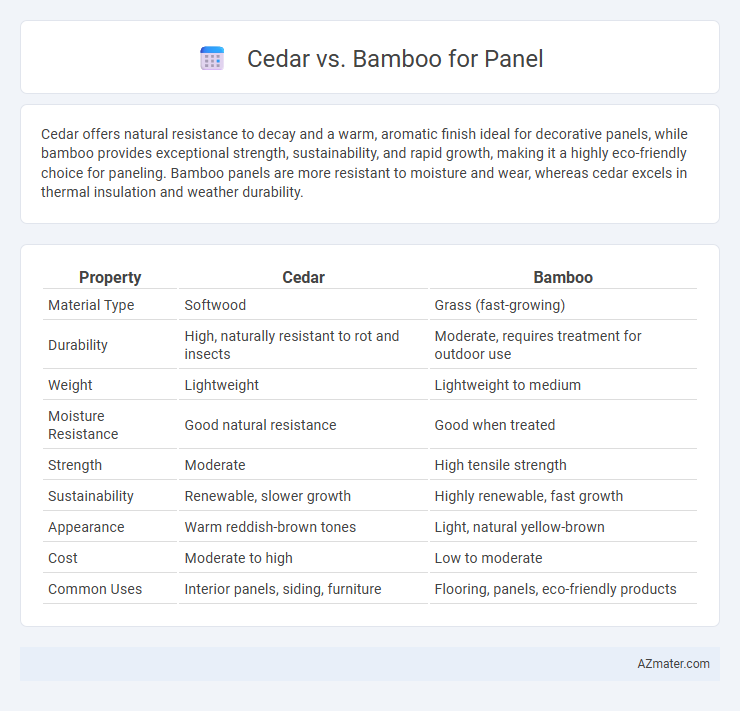Cedar offers natural resistance to decay and a warm, aromatic finish ideal for decorative panels, while bamboo provides exceptional strength, sustainability, and rapid growth, making it a highly eco-friendly choice for paneling. Bamboo panels are more resistant to moisture and wear, whereas cedar excels in thermal insulation and weather durability.
Table of Comparison
| Property | Cedar | Bamboo |
|---|---|---|
| Material Type | Softwood | Grass (fast-growing) |
| Durability | High, naturally resistant to rot and insects | Moderate, requires treatment for outdoor use |
| Weight | Lightweight | Lightweight to medium |
| Moisture Resistance | Good natural resistance | Good when treated |
| Strength | Moderate | High tensile strength |
| Sustainability | Renewable, slower growth | Highly renewable, fast growth |
| Appearance | Warm reddish-brown tones | Light, natural yellow-brown |
| Cost | Moderate to high | Low to moderate |
| Common Uses | Interior panels, siding, furniture | Flooring, panels, eco-friendly products |
Introduction to Cedar and Bamboo Panels
Cedar panels are renowned for their natural resistance to decay, moisture, and insect damage, making them a durable and low-maintenance choice for interior and exterior applications. Bamboo panels offer a sustainable alternative, known for their rapid growth and impressive strength, providing an eco-friendly option with a distinctive, modern aesthetic. Both materials deliver unique benefits in terms of environmental impact, durability, and visual appeal, catering to different design and performance needs.
Material Properties: Cedar vs Bamboo
Cedar panels offer superior natural resistance to decay, insect damage, and moisture due to their high oil content and dense grain structure, making them ideal for long-lasting outdoor applications. Bamboo panels provide exceptional tensile strength and flexibility, combined with rapid renewability and sustainability as a fast-growing grass, though they may require treatment to enhance durability and moisture resistance. Both materials contribute to eco-friendly construction, but cedar excels in natural resilience, while bamboo balances strength with environmental benefits.
Durability and Strength Comparison
Cedar panels offer excellent durability with natural resistance to decay, insects, and moisture, making them ideal for outdoor applications. Bamboo panels exhibit superior strength due to their high tensile properties, often surpassing traditional hardwoods, but may require treatment to enhance durability against elements and pests. When comparing the two, cedar provides consistent long-term resilience in diverse climates, while bamboo excels in mechanical strength but may need maintenance to ensure lasting performance.
Environmental Impact and Sustainability
Cedar panels are derived from slow-growing trees, which require longer forest regeneration periods, whereas bamboo panels come from a rapidly renewable grass species that can be harvested every 3 to 5 years, significantly reducing deforestation. Bamboo's extensive root system helps prevent soil erosion and sequesters more carbon dioxide compared to cedar trees, enhancing its sustainability profile. Both materials offer biodegradable properties, but bamboo's faster growth rate and higher CO2 absorption make it a more environmentally friendly choice for sustainable panel production.
Aesthetic Appeal and Design Versatility
Cedar panels offer a rich, warm hue with natural variations and a distinct grain pattern that enhances rustic and traditional designs, while bamboo panels provide a sleek, uniform appearance suited for modern, minimalist aesthetics. Bamboo's fine texture and consistent color allow for versatile finishes and easy customization, making it ideal for contemporary interiors. Both materials age gracefully, but cedar's natural oils contribute to a weathered patina, whereas bamboo maintains its fresh, smooth look with appropriate treatment.
Cost Analysis: Cedar vs Bamboo Panels
Cedar panels typically cost between $7 to $12 per square foot, while bamboo panels range from $6 to $10 per square foot, making bamboo a more budget-friendly option. Bamboo offers rapid renewability and lower environmental impact, which can translate to long-term savings despite the initial cost similarities. Maintenance expenses tend to be higher for cedar due to its susceptibility to rot and insect damage, whereas bamboo panels usually require less upkeep over time.
Installation Process and Maintenance
Cedar panels offer straightforward installation with dimensional stability that resists warping, ensuring easy handling and consistent alignment during setup. Bamboo panels require precise acclimation before installation to prevent expansion or contraction, making initial preparation more critical for a secure fit. Maintenance for cedar involves regular cleaning and periodic sealing to maintain its natural resistance to decay, while bamboo demands more frequent moisture protection and UV-resistant coatings to preserve its durability and appearance.
Resistance to Moisture and Pests
Cedar panels exhibit superior resistance to moisture due to natural oils that repel water and inhibit decay, making them ideal for damp environments. Bamboo panels, while less inherently moisture-resistant, benefit from modern treatment processes that enhance their durability against mold and mildew. Both materials resist pests effectively, but cedar's natural insect-repellent properties provide longer-lasting protection without chemical additives.
Best Applications for Cedar and Bamboo Panels
Cedar panels excel in exterior applications such as siding, fencing, and decking due to their natural resistance to rot, insects, and weathering. Bamboo panels are ideal for interior design elements including wall coverings, flooring, and decorative accents, offering sustainability and high tensile strength. Both materials provide unique aesthetic and ecological benefits, with cedar favored for outdoor durability and bamboo for eco-friendly indoor use.
Choosing the Right Panel Material for Your Project
Cedar panels offer natural resistance to decay and insects, making them ideal for outdoor projects requiring durability and a warm aesthetic. Bamboo panels provide a sustainable and fast-growing alternative, boasting high strength-to-weight ratios and a modern look, perfect for eco-friendly interiors. Selecting between cedar and bamboo depends on environmental exposure, budget, and desired design style, ensuring optimal performance and visual appeal for the specific application.

Infographic: Cedar vs Bamboo for Panel
 azmater.com
azmater.com